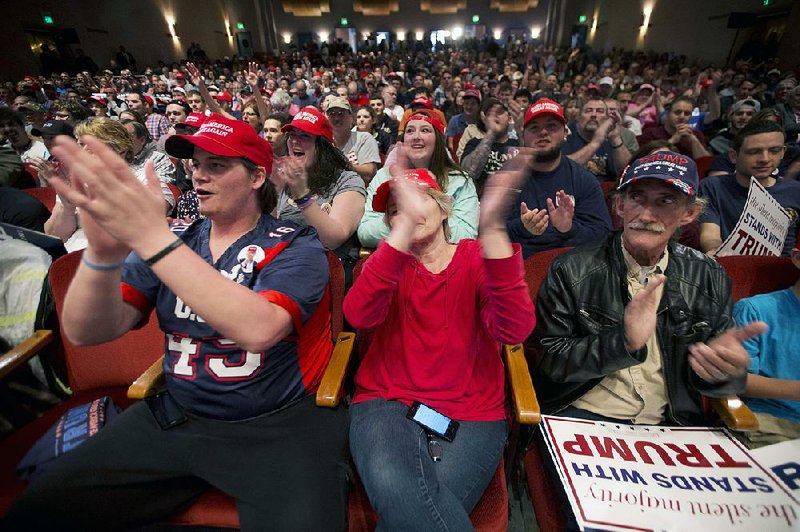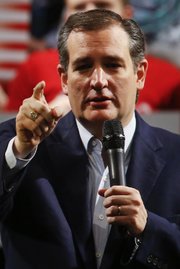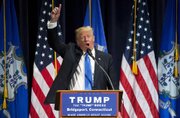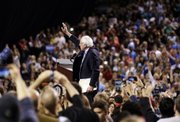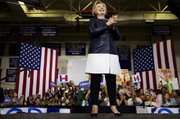BRIDGEPORT, Conn. -- Donald Trump told supporters Saturday that he's not changing his pitch to voters, two days after his chief adviser assured Republican officials that the party's front-runner would show more restraint while campaigning.
FULL ELECTION COVERAGE
"You know, being presidential is easy -- much easier than what I have to do," he told thousands at a rally in Bridgeport, Conn. "Here, I have to rant and rave. I have to keep you people going. Otherwise you're going to fall asleep on me, right?"
Trump declared to the crowd that he has no intention of reversing any of his provocative policy plans, including building a wall along the Southern border.
"Everything I say I'm going to do, folks, I'll do," he said.
Trump and his rivals in both parties were out campaigning Saturday across the Northeastern states that hold primaries Tuesday, including Pennsylvania, Delaware, Maryland, Rhode Island and Connecticut.
U.S. Sen. Ted Cruz, R-Texas, campaigned early Saturday near Pittsburgh, while Ohio Gov. John Kasich stumped in Rhode Island.
For the Democrats, Hillary Clinton, former U.S. secretary of state, campaigned in Connecticut and Rhode Island, and Sen. Bernie Sanders of Vermont was in Baltimore. Clinton talked about higher wages for workers and early childhood education, while Sanders highlighted his differences with Clinton on everything from the minimum wage to free-trade agreements.
Clinton's advisers and aides also have begun discussions about who should be her running mate, seeking to compile a list of 15-20 potential picks for her team to start vetting by late spring.
On Thursday, Trump's new chief adviser, Paul Manafort, met with top Republican officials and told them that Trump, known for his over-the-top persona and brashness, has been "projecting an image."
But at a Saturday rally in Waterbury, Conn., Trump joked about how it's easy to be presidential, making a series of faux somber faces. Then he told the crowd that he can be serious and policy-minded when he has to be.
Manafort "said, 'you know, Donald can be different when he's in a room.' Who isn't?" asked Trump. "When I'm out here talking to you people, I've got to be different."
Trump blasted Cruz, accusing him of twisting Manafort's words for political gain. Cruz has used Manafort's comments to attack Trump's authenticity, saying in interviews Thursday that Trump has been "lying to us" and is "pretending" to be a conservative in order to fool voters.
"[Cruz] took the statement of a campaign guy who just wanted to say, 'We can all be friends, we're going to get along,'" Trump told the crowd in Waterbury. "'Donald's not always like this, this isn't always Donald, Donald's very smart, and he's very calm,' which is true, actually, I actually have low blood pressure, can you believe it?" Trump said.
Clinton, too, weighed in on the issue from a Central Falls, R.I., rally Saturday evening. She said Trump keeps saying things like, "'You know, I didn't really mean it. It was all part of my reality TV show.'"
"If we buy that, shame on us," Clinton said.
Trump also criticized those who recorded the conversation with Manafort, saying that while the comments were mostly accurate, they have been misconstrued.
"To show you how honorable the people in the room were, they taped these conversations. They didn't tell anybody. Probably illegal," Trump said. "I wonder if it's legal. Maybe they have to go to jail."
Trump is viewed by many as likely to win the remaining presidential contests and reach the required 1,237 delegates to clinch the GOP presidential nomination, but Cruz and Kasich are still working to thwart that and to force the race into a contested convention.
Cruz addressed about 1,000 supporters Saturday in a high school outside of Pittsburgh. His reception was raucous, although the crowd didn't initially know how to react to his opening statement: "Let me say something that is profoundly painful for someone who grew up as a fan of the Houston Oilers, God bless the Pittsburgh Steelers."
Cruz told Pennsylvanians that Tuesday "is going to be a pivotal day," but he also took time Saturday to travel to Indiana, which doesn't vote until next month. Trump is thought to be favored in Pennsylvania, while Cruz's evangelical roots could give him a boost in Indiana.
Also Saturday, Cruz blasted Trump's recent suggestions that building separate transgender restrooms is "discriminatory" and costly. Cruz said that should be "the choice of the given location, of the given local government to allow that, to provide for that."
For weeks, Trump has attacked the Republican delegate system, calling it "rigged." And Pennsylvania has an especially confusing delegate system.
The primary winner there will get 17 delegates. But 54 delegates will be allowed to vote for whomever they choose. The ballot will feature 162 potential delegates but no information about whom they support.
"That's why on Tuesday, everyone has to go out and vote. We have to win big because the system is rigged," Trump told supporters Friday at a rally in Harrington, Del.
Also Saturday, former Republican presidential candidate Marco Rubio of Florida said he has no interest in being vice president and has no plans to endorse any presidential candidate. But, he said, he will support "whoever is nominated and named by the party."
In an interview with Al Punto Florida, a new Spanish-language public affairs program to air statewide in Florida this morning, Rubio said, "I will let voters decide what will happen."
As for the vice presidency, Rubio said, "I'm really not seeking it, I'm not requesting it and it won't happen."
Clinton and Sanders
Clinton, the Democratic front-runner, participated in a round-table event Saturday in Connecticut. She discussed with some of New Haven's working families ways to raise wages, promote early childhood education and reduce the pay gap between men and women.
"Equal pay -- we shouldn't be talking about it in 2016. It is almost embarrassing," Clinton said.
She said it is "way past time that we have a raise in the nationwide minimum wage" of $7.25 an hour and that the nation should support cities and states like New York and California "that are willing to put a higher floor under low-wage workers."
Sanders spoke Saturday to a boisterous crowd of mostly young people in Baltimore where he railed against big banks and his differences with Clinton.
He hammered at "disastrous trade policies," describing them as not a sexy issue but an important issue, saying that "we are seeing corporation after corporation shut down in the United States throw millions of workers out in the street, people who are earning a living wage."
"I oppose every one of these disastrous trade agreements. She supported almost every one of them," he said of Clinton, receiving a chorus of cheers.
His rally at a downtown arena was his first campaign stop in Baltimore since December, when he toured the impoverished neighborhood that was home to Freddie Gray, the black man whose death in police custody sparked rioting in the city last year.
Sanders has continued to talk on the campaign trail about his astonishment at the conditions he saw there, including many boarded-up homes, and a lack of banks and grocery stores.
During his Saturday visit, Sanders suggested that Baltimore's challenges are a result of the country's misplaced priorities.
"How do we always seem to have trillions of dollars for a war in Iraq or elsewhere, but we don't apparently have the money to rebuild inner cities in America?" he asked.
In Scranton, Pa., on Friday night, Clinton ended a busy day with a rally before 1,200 people -- and a memory-lane visit to an Italian restaurant, where patrons included a couple who had lived next door to her grandparents "on Diamond Avenue," Clinton said later.
Her father, born and raised in Scranton, "thought it was God's country," Clinton said Friday. "We went there every single year."
Sanders is not ceding Pennsylvania or the other four states with primary votes Tuesday. His campaign schedule has been full in recent days.
On Friday, he gathered with faith leaders in Philadelphia and focused on military and veterans issues in Gettysburg before heading to Millersville University, where mostly young, enthusiastic supporters filled a gym for a rally at which he continued to stress his differences with Clinton and to highlight her Wall Street connections.
Sanders made a campaign stop Saturday afternoon in Wilmington, Del., and planned to return to Baltimore for an evening event.
In an interview on NBC's Meet the Press, Sanders said he's trailing Clinton because "poor people don't vote." He added, "That's just a fact. That's a sad reality of American society. And that's what we have to transform."
Information for this article was contributed by Jill Colvin, Will Weissert, Ken Thomas, Susan Haigh, Vivian Salama, Jonathan Lemire and Sergio Bustos of The Associated Press; by Jose A. DelReal, Anne Gearan and John Wagner of The Washington Post; and by Patrick Healy of The New York Times.
A Section on 04/24/2016

